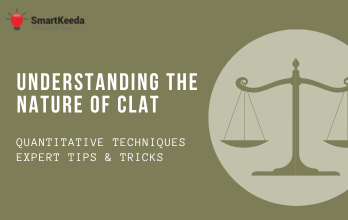
The CLAT or Common Law Admission Test is a national-level entrance examination conducted in India for admissions to undergraduate (UG) and postgraduate (PG) law programmes offered by 22 National Law Universities (NLUs).
Being one of the toughest law entrance exams in the country, with a high level of competition and a limited number of seats available in the top National Law Universities (NLUs), CLAT 2025 Preparation demands a strategic approach. You need to develop a well-structured study plan that covers all the sections of the exam, including English language, Current Affairs, Legal Reasoning, Logical Reasoning, and Quantitative Techniques.
Through this article, we will provide an effective CLAT 2025 Preparation strategy spanning over 60 days, ensuring that you are well-prepared to excel in the exam and secure admission to your dream National Law University (NLU).
Overview of CLAT 2025
This year the CLAT UG exam in 2025 will feature a total of 120 questions instead of 150 questions that must be completed within a time limit of 2 hours. The 120 questions will be distributed among five sections: English Language, Current Affairs Including General Knowledge, Legal Reasoning, Logical Reasoning, and Quantitative Techniques, ensuring a comprehensive evaluation of the candidate's aptitude and skills.As per the consortium, the CLAT exam will be conducted once a year, in the month of December, providing aspiring law students with a specific timeframe to prepare and aim for their desired scores. To accommodate a large number of candidates, the exam will be conducted in over 127 exam centres across the country. The CLAT application form for 2025 will be made available shortly on the official website.
To provide you with a clear understanding of the CLAT 2025 exam format, presented below is a concise overview in tabular form.
Exam Pattern and Syllabus
| Features |
UG Programme (5-year integrated LL.B.) |
| Mode of Exam | Offline |
| Duration | 2 Hours |
| Question Format | Multiple Choice Questions (MCQ) |
| Maximum Questions | 120 Questions |
| Maximum Marks | 120 Marks |
| Subjects | The UG exam consists of five sections, namely, English Language, and Current Affairs including General Knowledge, Legal Reasoning, Logical Reasoning, and Quantitative Techniques. |
| Frequency of Exam | Once a year |
| Medium of Exam | English |
| Exam date | NA |
| Negative Marking Scheme | Yes (-0.25 marks for every wrong answer) |
| Official Website | https://consortiumofnlus.ac.in |
Weightage of Subjects and Sections
With the recent announcement by the consortium regarding a reduction in the number of questions for the CLAT UG exam, it is important to understand the expected weightage of subjects and sections. The exam will now consist of a total of 120 questions, which are expected to be distributed across five sections as follows:| Section | Number of Questions | Weightage |
| English Language | 23-25 Questions | 20% |
| GK & Current Affairs | 28-30 Questions | 25% |
| Logical Reasoning | 23-25 Questions | 20% |
| Legal Reasoning | 28-30 Questions | 25% |
| Quantitative Techniques | 10-12 Questions | 10% |
| Total | 120 Questions | 100% |
Setting Clear Goals and Objectives
If you are one of the many aspirants gearing up for the CLAT 2025 exam, you must be wondering how to prepare effectively to crack it. The key to success is to have a well-planned and practical CLAT 2025 Preparation strategy, and that starts with setting clear goals and objectives. By defining what you want to achieve in the exam, whether it's a desired score or admission to a specific National Law University, you can align your efforts and stay focused throughout your preparation journey.
Attempt CLAT Previous Year
With over 60,000 students vying for a limited number of seats in the top NLUs, it is crucial to approach the exam with dedication and a strategic mindset. Before devising a study plan for CLAT 2025 Preparation, it is important to assess your current level of preparation.By attempting CLAT Previous Year Mock Tests, you can gauge your readiness for the upcoming exam. Analyzing your performance in these mocks will help you identify your strengths and weaknesses, allowing you to tailor your preparation accordingly. Setting clear goals based on your mock test performance will keep you focused and motivated throughout your CLAT 2025 Preparation journey.
Attempt a Free Previous Year CLAT Paper here!
After completing Smartkeeda CLAT Previous Year mock test:
• Open the Smart-analysis tool of the Smartkeeda mock test and analyze your performance by assessing the score obtained, percentile achieved, time spent over each question, speed, and accuracy.
• Keep a note of the topics or sections where your score is relatively low. This analysis would help in identifying the areas that require improvement and additional focus.• By understanding your current level of preparation, set a target score & start working on your weak areas to achieve this score with the help of targeted Topic Tests & Sectional Tests for CLAT by Smartkeeda.
Defining Target Scores
You can get a fair idea of a good CLAT score from the following table. However, it is important to note that setting an ideal score benchmark based solely on previous year's scores may not be the most accurate way to evaluate yourself. CLAT cutoffs can vary each year depending on the difficulty level of the exam and other factors. Additionally, this year, with the significant reduction in the number of questions, students may have the opportunity to attempt more questions within the given time frame.
This table provides an overview of the marks versus rank achieved by CLAT toppers in 2024
| Name |
Rank CLAT 2024 |
Marks Obtained (Out of 150) |
| Jai Bohara | AIR 1 | 108 Marks |
| Pradyot Shah | AIR 2 | 99.99 Marks |
| Rahul | AIR 3 | To be announced |
| Pragnya Amireddy | AIR 4 | To be announced |
| Vinay | AIR 6 | 104.25 Marks |
| Arijit Bansal | AIR 7 | To be announced |
This data demonstrates that scoring in the range of 65-70% marks in the CLAT exam can significantly enhance your chances of securing admission to the top National Law Universities (NLUs) of India.
So, it is crucial to maintain a keen focus on your percentage of marks obtained in each mock test throughout your CLAT 2025 Preparation. Set a target of achieving over 65% in each CLAT mock test as it aligns with the desired score range for admission to prestigious NLUs. By consistently aiming for this target, you can gauge your progress and work towards improving your performance
Creating a Realistic Study Plan
This year, CLAT 2025 is going to be held in the month of December, and to crack this highly competitive law entrance exam, you are required to complete the vast syllabus in just a few months. The key to success lies in having a realistic study routine that balances time allocation for each subject, and incorporates conceptual learning, CLAT mock tests, and regular revision.
Allocating Time for Each Subject
To effectively allocate the right amount of time to each subject, it is crucial to understand the weightage assigned to them in the CLAT exam. English language, GK & Current Affairs, Legal Reasoning, Logical Reasoning, and Quantitative Techniques are key sections in the CLAT 2025 exam. By analyzing the weightage of each subject, you can prioritize your study time accordingly.For instance, if GK & Current Affairs carries the highest weightage of around 25%, it is advisable to allocate more time to cover this section comprehensively. Similarly, Quantitative Techniques have a lower weightage of 10% in the syllabus, you can dedicate relatively less time to this section. By understanding the weightage of each subject, you can create a study plan that ensures efficient and targeted preparation.
Balancing Mock Tests and Conceptual Learning
Achieving success in CLAT 2025 exam would require a balance between conceptual learning and attempting mock tests. While CLAT mock tests help you understand the CLAT exam pattern, manage time, and assess your performance, conceptual learning forms the foundation of your understanding and application of the topics. It is crucial to allocate sufficient time to grasp the concepts, theories, and principles underlying each subject.To facilitate an easy understanding of the topics, Smartkeeda provides absolutely free CLAT video lectures on YouTube Channel LawEx CLAT Coaching by Smartkeeda for all the subjects asked in CLAT including Legal Reasoning, Logical Reasoning, English Language, & Quantitative Techniques. The video lectures are prepared by highly qualified CLAT faculty and cover all the complex topics in a way that's easy to understand.
You can visit our YouTube channel, LawEx Coaching by Smartkeeda, and attend CLAT free video classes on each subject before attempting a CLAT mock test.
Importance of Regular Revision
Considering the vast syllabus of the CLAT 2025 exam, it is natural to forget information if not revised regularly. To combat this, it is crucial to create concise and effective short notes for important topics, formulas, and shortcuts. These notes would serve as a quick reference guide, helping you retain and recall the key information. Regular revision of these notes is essential to reinforce what you have learned and maintain a strong grasp of the subject matter. By incorporating regular revision sessions into your study routine, you enhance your retention capabilities and improve your overall understanding.
Improving Reading Comprehension Skills
Being a CLAT aspirant, you must recognize the importance of having excellent Reading Comprehension skills. The entire CLAT 2025 question paper will consist of passage-based questions, making strong reading abilities crucial for success. Each section of the CLAT exam will feature passages comprising approximately 400-450 words, followed by multiple-choice questions. You must have the ability to quickly extract relevant information and draw logical conclusions from the given passage.
To overcome this challenge, Smartkeeda provides CLAT speed mock drills that are specifically designed to improve your speed in different areas.
Reading Drills
Reading drills provided by Smartkeeda are specifically designed to help students improve their reading speed and comprehension skills. These drills contain a variety of passages, of around 450 words, identical to the ones asked in the CLAT exam along with detailed explanations and analysis of the passages. By practicing with Reading drills regularly, you can develop a better understanding of the structure of the exam and learn how to quickly identify the key points and ideas.
• Click here to attempt Reading Mock Drill for CLAT 2025!
Developing Logical Reasoning Skills
Logical reasoning involves problem-solving, critical thinking, and making informed decisions based on evidence and reasoning. These skills play a significant role in the CLAT exam as you are expected to analyze complex problems presented in passages and derive logical conclusions. By enhancing logical reasoning abilities, you can effectively evaluate arguments, identify patterns of reasoning, and draw accurate inferences. Furthermore, these skills are highly valuable in the field of law, where the ability to analyze information, make sound judgments, and construct persuasive arguments is essential.Improving logical reasoning skills during CLAT 2025 Preparation requires consistent practice and strategic approaches. Here are some effective methods to enhance your logical reasoning abilities:
• Practice: Solve a variety of logical CLAT reasoning questions and puzzles regularly. Start with basic-level questions and gradually progress to more complex ones. This will help you develop analytical thinking and problem-solving skills.
• Analyze Arguments: Read articles, magazines, and logical reasoning passages to identify the main arguments presented. Try summarizing these arguments and drawing logical conclusions based on the provided information.
• Practice Critical thinking: Engage in activities that promote critical thinking, such as debating, discussing complex issues, and analyzing different perspectives with fellow aspirants. Try to understand their point of view as well.
• Attend Video Classes: To enhance your CLAT logical reasoning skills, develop effective critical thinking abilities & gain a deeper understanding of logical reasoning principles, attend free logical reasoning & critical thinking video lectures offered by LawEx coaching by Smartkeeda YouTube channel.
Click here to attend Free Logical Reasoning Video classes
• Solve puzzles and brain teasers: Engage in activities that stimulate logical reasoning, such as solving puzzles, riddles, and brain teasers. These exercises enhance your ability to think logically, make connections, and solve problems creatively.
Staying Updated with Current Affairs
LawEx Magazine by Smartkeeda
For CLAT aspirants seeking a convenient and effective way to stay updated with current affairs, Smartkeeda offers a comprehensive and well-organized approach to current affairs preparation, "LawEx Magazine". This fortnightly publication serves as an excellent resource for current affairs preparation, specifically tailored for the CLAT exam. LawEx Magazine by Smartkeeda provides a wide range of valuable resources, including reading drills, crossword puzzles, short news summaries with key points, detailed news articles, pictorial representations of news for better retention, static general knowledge, current general knowledge, and GK quizzes.• Click here to download the CLAT Preparation App by Smartkeeda to read the free Current Affairs Magazine!
Current Affairs MockDrill
As you know, quizzes are an exceptional way to enhance your retention, each month we provide 25-30 current affairs mock drill quizzes, each drill comprising 10 passage-based questions. Before attempting the Smartkeeda monthly current affairs mock drills, you can download and access a short current affairs PDF containing a summary of important events to refresh your memory and improve your chances of scoring well in the mockdrill.
• Click here to attempt the Current Affair Mock drill for May 2024!
Last Week’s Preparations and Exam-Day Strategies
As you approach the final week of preparation for the CLAT exam, it is crucial to wrap up your CLAT 2025 Preparation effectively. This is the time to consolidate your knowledge, revise key concepts, and fine-tune your exam strategies. Here are some key points to consider:1. Revise Important Topics: Focus on revising the topics you have consistently prepared over the past few months. Begin by revising the topics with the highest weightage to ensure a strong foundation. Avoid learning new topics during this last week to prevent an overload of information.
2. Stay Calm: Stay calm and have confidence in your preparation. Remind yourself of the hard work and effort you have put in over the months leading up to the exam. Trusting your abilities will help you approach the exam with a positive mindset.
3. Attempt Easy Topics First: When starting the exam, consider attempting the easier topics first. This approach helps build confidence and allows you to secure marks early on. It also helps you manage your time better, leaving more time for the challenging questions later.
4. Avoid Guess attempts: Remember that CLAT 2025 exam has a negative marking scheme. For every incorrect answer, 0.25 marks will be deducted from your total score. Therefore, it is crucial to be cautious while attempting questions and avoid unnecessary guesswork.
5. Time Management: Keep in mind the time limit for each section of the exam. Allocate your time wisely to ensure that you have sufficient time to attempt all the questions. Avoid spending too much time on a single question and maintain a steady pace throughout the exam.
CLAT 2025 Preparation requires dedication, perseverance, and a strategic approach. With the right mindset and a well-executed plan, you can conquer the CLAT exam and unlock a world of opportunities in the field of law. So, believe in your abilities and remember that each step you take brings you closer to your goal of securing admission to your dream law university.
All the Best!

Author : Rohit Sharma
Hi, I am Rohit Sharma, the head of the Law exams vertical at Smartkeeda and an alumnus of NLU Punjab. Having successfully cleared the CLAT exam twice, I am currently engaged in teaching Legal Reasoning on the LawEx YouTube channel. Moreover, I contribute by writing blogs that are specifically tailored to the CLAT exams.
FAQ’s
CLAT or Common Law Admission Test is a national-level entrance examination for admissions to undergraduate (“UG”) and postgraduate (“PG”) law programmes offered by 22 National Law Universities in India (NLUs). Several affiliate universities and organizations also use the CLAT exam for admissions and recruitment respectively.
There is no age restriction for taking the UG CLAT 2025 exam and enrolling in an LLB programme at a national law university. Candidates of any age group can take this exam.
Yes, you can give the Common Law Admission Test (CLAT) after completing your 12th standard given that you fulfill the eligibility criteria of the minimum qualifying score to attempt the CLAT 2025 exam, i.e., you must secure 45% marks if you belong to General / OBC / PWD / NRI / PIO / OCI categories & 40% marks or equivalent grade if you belong to SC/ST categories.
Assessing and analyzing your performance in mock tests for CLAT preparation helps you identify your strengths and weaknesses, allowing you to focus on areas that require improvement. Additionally, it enables you to track your progress, set realistic goals, and make necessary adjustments to your study plan.
Smartkeeda offers comprehensive study materials such as CLAT video lectures, LawEx magazine for current affairs, topic tests for subject-specific revision, CLAT Sectional Tests, and CLAT full-length mock tests & previous year papers for assessing performance in CLAT preparation.
To improve your logical reasoning skills for the CLAT exam, practice solving a variety of logical reasoning questions from previous year papers and mock tests. Analyze the patterns of reasoning, and practice drawing logical conclusions. Additionally, familiarize yourself with common logical reasoning concepts and techniques through online resources, video lectures, and study materials.





